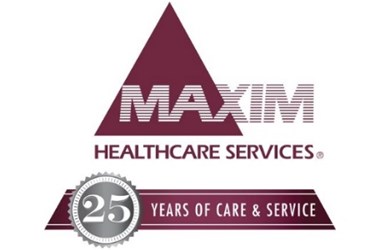New Analysis Highlights Growing Gap In Access To Home Health Care For Medi-Cal Patients

Medically fragile children and other high-needs patients disproportionately impacted
Sacramento, CA /PRNewswire/ -- Pediatric Medi-Cal patients in need of home health services face significant barriers in accessing care, according to a new analysis of California's home health care market. Citing sizeable increases in new Medi-Cal enrollees and a lack of growth in agencies willing to serve Medi-Cal patients, the study underscores a growing disparity in access to home care services between Medi-Cal and commercially insured patients.
The study, conducted by Leavitt Partners1 and funded by Maxim Healthcare Services, Inc., found that the number of Medi-Cal certified home health agencies has doubled from 600 in 2002 to more than 1,200 in 2013, yet the total number of home health visits provided to Medi-Cal patients has remained stagnant since 2002. As a result, patients often endure long waits for services, receive inadequate numbers of visits or are forced to seek care in more costly hospital settings. The full report can be accessed at http://leavittpartners.com/2015/06/analysis-of-california-home-health-care-decreasing-access-for-medi-cal-patients/. Other highlights of the study include:
- The California Medi-Cal population grew by 39 percent since 2008, adding 1.8 million new enrollees, but the total number of home health visits provided to Medi-Cal patients remained almost unchanged during the same period.
- In 2002, 78 percent of the state's home health agencies treated Medi-Cal patients, but in 2013, less than 44 percent of home health agencies provided services to this population.
- Sixty percent of the home health agencies treating Medi-Cal patients can provide no more than 25 percent of the approved hours of care, creating significant hardships for patients and their families.
- Seventeen percent of Medi-Cal certified agencies place a cap on the number of Medi-Cal patients they will accept.
- By 2018, only 40 percent of Medi-Cal certified agencies are expected to accept Medi-Cal patients in a given year.
"We are extremely concerned about gaps in access to vital home health services for Medi-Cal patients inCalifornia, particularly for those patients with the most serious illnesses who are not part of the Managed Care Medi-Cal System due to the severity of their conditions," said Kelli Camp, RN, Vice President of Clinical Services, West Region, Maxim Healthcare Services. "The agencies who serve this most vulnerable population are stretched thin. We face ongoing challenges in recruiting and retaining necessary nurses due to low reimbursement rates and competition with other healthcare providers who can offer higher starting wages."
The Leavitt Partners study focuses, in particular, on gaps in availability of specialized pediatric home health services, noting that the percentage of Medi-Cal certified agencies offering pediatric services declined from 45 percent in 2002 to just 27 percent in 2013. The report estimates that by 2018, the percentage of Medi-Cal certified agencies serving pediatric patients will drop below 25 percent. The services these agencies provide are critical for families caring for children with serious underlying medical conditions and disabilities who require around- the-clock clinical support, including tracheotomy care, tube feeding, ventilator care and other complex services.
The study found that when home health agencies were presented with a hypothetical pediatric patient requiring ventilator and tracheotomy care, 50 percent reported they could accept a privately insured patient immediately, while only 28 percent reported they could accept a Medi-Cal patient right away. The findings suggest that Medi-Cal agencies face greater strains on their resources, making it more difficult for Medi-Cal patients to find a suitable agency than patients with other types of insurance.
Researchers concluded that without correction, the gap in access between Medi-Cal patients and other patients will continue to widen for home health services in California. Further research is needed to evaluate long-term costs associated with the gap in access and the diversion of services to higher cost inpatient settings.
"Reimbursement rates for home care services have not been increased in California since 2000, causing many providers to reduce the number of Medi-Cal patients they serve, create waiting lists or focus solely on commercial patients," said Jarrod DePriest, Vice President of Operations, West Region, Maxim Healthcare Services. "To address these challenges, other states are experimenting with alternative reimbursement methods like pediatric rates for skilled nursing care, blended skilled nursing rates, shift differential payments and acuity assessment tools to try to close the access gaps. These and other approaches, including value-based payments tied to quality measures, must be considered to help address this growing health crisis in California."
ABOUT LEAVITT PARTNERS
Leavitt Partners is a health care intelligence business. The firm delivers collaborative, high-value intelligence that helps clients transition to new models of care. Through its member-based collaboration called Health Intelligence Partners™ and direct services to clients, the consulting firm provides the best available window to the future of American health care.
ABOUT MAXIM HEALTHCARE SERVICES
Maxim Healthcare Services, Inc. provides home healthcare, medical staffing, and wellness services across the U.S. Founded in 1988, Maxim is focused on delivering quality patient care and a commitment to employee development with an emphasis on customer service. Today, Maxim is an established partner in the healthcare industry and is constantly evolving to address the needs of our patients, caregivers, and clients. Our focus on quality patient care and compliance is the foundation for our success. Learn more aboutMaxim Healthcare Services, or get more information about available Maxim Healthcare positions.
1 The study is based on a detailed analysis of data provided by the California Office of Statewide Health Planning and Development (OSHPD), along with a statewide poll conducted in May of 2015, with over 900 respondents representing 61 percent of active home health agencies in the state.
Source: Maxim Healthcare Services, Inc.
Copyright 2015 PR Newswire. All Rights Reserved